Part 3: Caring for someone with a dual diagnosis of dementia and paranoid schizophrenia

This blog tracks living with and then caring for a mother with paranoid schizophrenia who was later diagnosed with mixed dementia and latterly Alzheimer’s disease. It is a personal story, but it also references studies and useful links that are relevant to the blog. Each person’s account of caring for someone with dementia is unique.
Hopefully some of this blog will be recognisable to other carers, and for researchers it might confirm your thoughts, spark debate or inspire ideas for future and current research. The references are only a snapshot of research and other useful information to help me and others understand what I and my mother have lived with during our lifetime. All comments and questions welcome.
Contact: helen.sloan@nihr.ac.uk
Part 3 of 3 parts: Living in a Care Home
Read part 1: The dual diagnosis of paranoid schizophrenia and dementia
Read part 2: Living Independently at home as dementia progressed
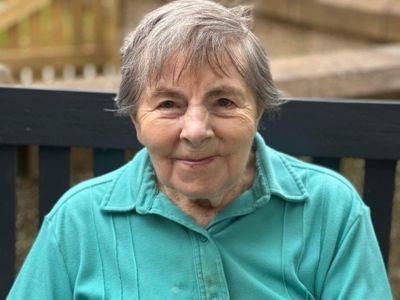
Admission to the care home impacted both mum and me in different ways. Initially she felt that she had done nothing wrong, was being sectioned, admitted to hospital and victimised, and that she would eventually go home. It was so hard to witness. I felt very guilty and anxious and tried without success to explain the situation.
I set up items from her flat in her room at the care home, but much of this she asked me to remove. The phone that had been so vital to mum at her flat took several months to be installed in her room, and even though I brought her old phone that she knew how to use, she had lost her ability to operate it. I was worried that she was going to lose access to a lot of the things she had taken for granted.
The plan was that my brother who lived close by would visit weekly, but with his disability and poor mental health he could not cope with the activity in the care home or mum’s decline. Being three hundred miles away, my own visits were erratic and intensive, one to two weeks followed by nothing for a couple of months. These visits would tire mum out. I kept in touch by the care home telephone and my brother phoned several times a day.
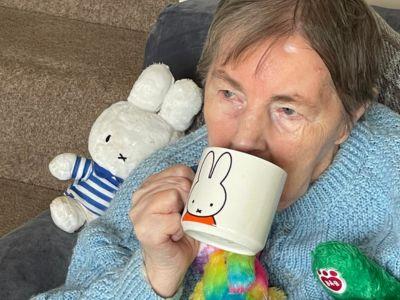
Mum gradually forgot why she was in the care home and about the notion of hospital admission. She oddly never asked to return to her flat. It stood empty for eighteen months as I also could not bring myself to accept that the care home was permanent. Mum could become irritated in the care home and definitely held suspicious thoughts about some people there that related to schizophrenia. The noise could upset her as she had lived quietly on her own. She spent a lot of time in her room because of the activity downstairs including the constant television, which she had never been a fan of. There was a good view from mum’s room and I hoped she enjoyed it – we had her moved from one that overlooked the car park. However, she also found a seat in the lounge overlooking the garden where she could watch the birds and avoid the noise. She started to get involved in the artwork the residents made and went out for coffees with her peers. She went on outings and special events for people with dementia. Having been tenacious about keeping her weight down all her life, she developed a new love of cake. Right up until the last few months of her residence at the care home, mum was an ace at throwing a ball into a netball net (from her seat of course) drawing from her school days in the netball team. This was so good to see as mum had spent so many years in her flat avoiding people and thinking that they were hostile on account of her schizophrenia. The impaired cognition meant that she could not invent the complex narratives that she had previously. It was rewarding to see her happier and engaged with life in the care home, and I have come to wish that I had been more sanguine about the schizophrenia which I resisted with tenacity.
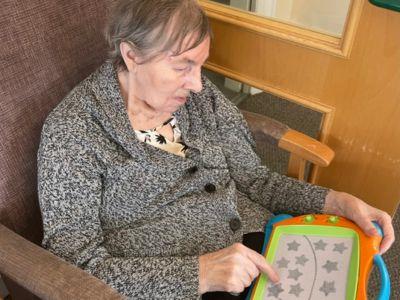
When I came up to visit, mum would come to stay in the house I rented with a view over the canal, marina and a local crag. She could sit in a chair facing that view for hours. I started to show musicals and cartoons to mum – High Society, Guys and Dolls, Hairspray, The Tales of Beatrix Potter, Singing in the Rain, Wacky Races, Tom and Jerry and mum was fascinated by Frozen. I remember showing High Society at the care home and everyone singing along. Most of the time mum smiled. I think and hope she enjoyed it. We went out for meals and she gained her appetite again following her loss of it while at home. We always ended with a cake-based dessert.
During the first year at the home, we developed a routine when I visited of a combination of staying for a night with us, a day out, and regular visits to the care home with a day or two off for her to rest. My partner was very supportive and popular with mum. She developed a fascination for everyday things that frequently made her laugh such as creaking doors and going up and down in the lift at the care home, which the staff were incredibly tolerant of I thought. One day we laughed so much at one of those sounds that a member of staff came to check we were all right. These were possibly the happiest times of mum’s life. She seemed carefree, focused on fun and we got on very well; and so differently from when the schizophrenia was dominant. Of course, dementia had its own challenges.
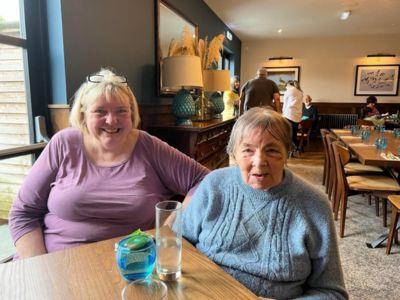
I organised outings that might bring memories back to her. Notably, we went to visit the rural church where mum got married and my grandfather was vicar. She had a memory of the place as she was silent all the way there while pointing at features in the landscape, looking out of the window attentively. My mum had a strong history with that area and clearly recalled something powerful. At one point when I visited her, she talked of taking cover in the Anderson shelter at the end of their garden in Liverpool while watching her house being bombed when she was a child in the Second World War. She had never mentioned it before and was clearly frightened. I discovered later that she and the family became homeless that night. She often asked if I was her mother – I did not care who she thought I was although I corrected her. I just wanted her to feel supported by my visits – mum’s confusion just had to be managed and accepted sometimes. Rather differently from the schizophrenia that had been so difficult to accept while I was growing up, I tried to embrace mum’s confusion.
It was not a standard mother-daughter relationship, but it felt close and rewarding. I developed a bond that we had not had before. Mum’s caring nature punched through as she began to collect dolls and teddies that went everywhere with her. I learnt about doll therapy in dementia and saw how much mum benefitted from it. We made sure there was always room in the car, at the dinner table and on the sofa for the ‘babies.’ Mum did not call them anything but to everyone in the care home they were the ‘babies.’ It gave me such pleasure to see mum enjoy looking after the dolls and toys.
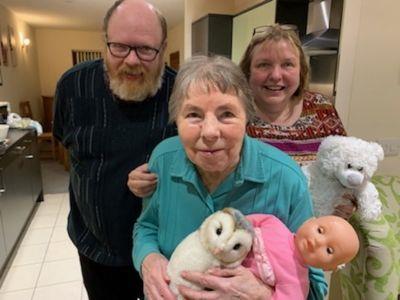
It was not all lovely. Mum, always so independent, did not like being taken to the shower by a carer and was often resistant to personal hygiene. This was not the behaviour of someone who had always been scrupulously clean and tidy, yet I was concurrently unsure of how I would have reacted to a stranger offering to take me to the shower. Eventually the need to purchase incontinence pads arrived. I have no idea why this came as a complete shock to me as I knew the progression of dementia. Purchasing them and having them sent to the care home eventually became as much a part of the routine as paying for the hairdresser or chiropodist. Later on, mum became prone to pouching her food (storing what she could not chew in her cheeks) and she was never receptive to me trying to retrieve food similarly to the teeth in the years before. We had to shorten her visits out, but she remained largely happy and content.
Mum did lose her dignity and independence following the progress of dementia like most people, but she developed a warmth and sense of humour that I liked to think was the real her without the negative narratives of schizophrenia that tormented her and made her so suspicious of the world. Throughout, mum never completely lost that wariness but it lasted for very short periods and then she forgot. She even made some friends in the care home. I noticed the positive and affectionate response that mum got from other residents and staff.
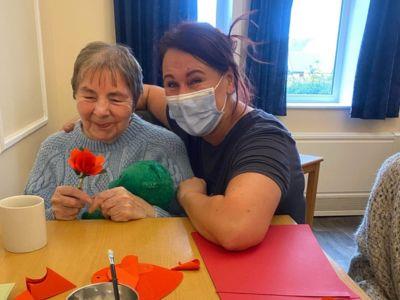
We were visiting my mum two weeks before the first Covid-19 lockdown was called. I had been reading up on the virus and was torn between driving back home to lock down early and staying to see mum. We decided to stay until our rental ran out and then went home with a boot full of groceries on 13/03/2020 for a self-enforced lockdown. The care home also locked down a bit earlier than the guidelines, as they were worried, and luckily erred on the side of caution throughout. In spite of their caution and an impressive access to Personal Protective Equipment (PPE), Covid found its way into the home twice over the next two years. 2020 turned out to be one of my busiest for advocacy work in mental health, mental capacity and social care, and my cases revealed some poor practice in the services. I was on high alert for mum although also unable to visit her. We talked most days on the telephone as before and I managed to get the staff to facilitate a weekly video call with her. Somehow, we managed to keep in touch, not lose awareness of each other, and to communicate. I remember sending flowers but by the time mum got them they were dead after being in lockdown for a week. I bought less perishable things after that eg memory facilitators through touch and smell kits which also benefitted others in the care home.
In January 2021, I got the call I was dreading. Mum had Covid. About three days later, I was asked to consider end of life care and putting a package of medication together for mum to use when the time came. It felt so final, and I was shocked. Mum had got through one outbreak in the home without infection, and I could not quite process it. An old friend from primary school whom I had stayed in touch with helped very bravely and generously to make some decisions about mum’s care. So many of my friends had seen mum the schizophrenic and were unable to see mum the person. This friend was different. Foremost, I decided that mum should not go to hospital in this context if the need arose – she had had enough of hospitals. But she was tough, fought it, and pulled through. I was so pleased and resolved to visit more often as soon as we were allowed.
Around this time, there was talk from the Community Mental Health Team about mum being taken off her anti-psychotic medication. I had had a conversation with a previous consultant a year before who had said that as things were going well, it might be better to keep things the same. There was some conflicting debate in the Community Mental Health Team, it seemed. Mum was expressing distress at her injections being administered, and the team felt it was time to stop. I argued the other consultant’s case about what changing the way my mum’s brain functioned might do to her at this later stage of dementia. I had seen a lot of bad practice in health and social care over Covid and was concerned that they might be using withdrawal of medication to cut costs. It was a dilemma and after a lot of discussion causing me distress (I had to keep reminding myself that it was about mum), we decided to keep the status quo which was not popular with everyone including mum’s carers. I felt that we had had a few of years of genuine happiness, and a small bit of distress once a month was worth it for that positive state to continue.
My visits increased but Covid had aged us all in one way or another. Mum had become quite frail, and she was less involved in activities than before. The care home could not cater for provision of activities for people with later stage dementia. I could see that mum was sleeping most of the time and had very little stimulus. Mum still loved cake when it was offered, and if her interest was piqued she would start engaging in activities again. I decided to provide a private one to one carer for a day a week so that mum could be involved in activities again. This carer, also called Helen, was invaluable and she embraced her role with enthusiasm and energy. We checked all the insurances, DBS and references which allowed mum to go out with her. Helen and mum had a great relationship and they either worked together in the care home art groups, went out for meals, or on other outings. Mum loved it. If both Helen and I were available, the three of us went out together as it was getting to the point that mum needed two to one support. There was a long period over the Covid pandemic when only designated carers could visit mum and Helen and I were named carers. Eventually I could take mum out with the family and visit my brother. She did not recognise him the first time we went to visit after Covid, although as the visit progressed she started to remember, which was a relief to everyone. We all took mum to a local nursery and visitor centre a couple of times that mum loved – animatronics, light displays, toys, plants and a new teddy for mum. Mum was wheelchair bound by this point, but she embraced it.

I could not have managed the years caring for mum with dementia without the support of my partner. He was great with mum and she loved it when he was around. Over the last two years of mum’s life, my visits became more and more regular and I stayed near her for longer periods, which my partner could not always accommodate due to work. I was reliant on him and Helen to help me with mum in those last two years.
Christmas was always a difficult time for me with my family. While I had overcome so much of my previous family traumas, this was the one last no go area for me. In 2022, my partner and I went to the care home Christmas lunch at a local hotel two weeks before the actual day, and much to mum’s amusement I sang along with the entertainment. I compared notes with carer Helen and it turned out mum liked a joke at our expense. It was a lovely event apart from the pieces of melon that I was unable to extract from mum’s cheeks (thankfully there was a skilled carer to hand and even my partner was unable to use his influence on this occasion). It was mum’s birthday on Christmas Eve and I considered staying on with her. The anxiety over a Christmas visit persisted. I decided not to stay but vowed I would go the next year when I had had a few months to prepare. Helen made a video call on mum’s birthday and we had an online celebration with her favourite champagne.
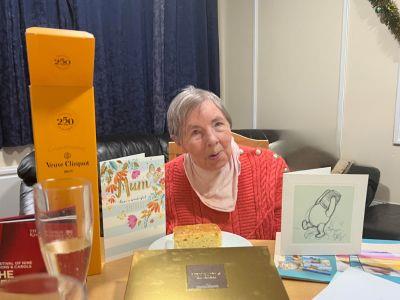
Tacitly, I knew that it was very unlikely that mum would still be around in Christmas 2023, but I kept thinking how resilient she was and that there might be a chance. I visited her in January and took her out for lunch for the last time. She was confused and kept trying to pour juice on her food and on the floor. The staff were very good with mum and liked her. She was a regular at the café which was very dementia friendly. They could see that I was struggling so allowed me out by a side door. Even with a swivel seat, mum was starting to find it difficult to get in and out of the car.
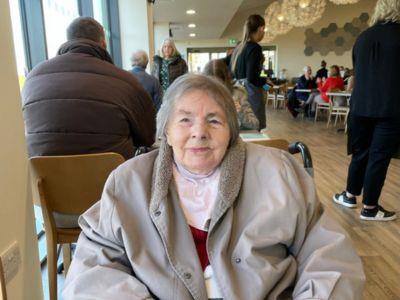
I went on a long holiday in February 2023. Each time I phoned mum, I was worried about her as she was ill. Helen told me she was trying to get her properly tested for an infection. Ten days into my holiday, I was told that mum was not eating and often could not take a phone call. I asked if I should return early. On my return, mum had deteriorated, was not eating or drinking and I was told that she was ‘stable and would not pass over the weekend.’ I rushed up regretting not having come home earlier.
I found mum asleep in bed and was informed she was dying. Throughout the next ten days I did not quite believe it as I sat with her mostly asleep (although there were a couple of times that she regained consciousness which were precious). Even when I got the call at 2am to say she had died, I was in disbelief. I drove to see her that night thinking she was still alive but realised the information I had been given when I saw her. I sat with her for a couple of hours and then left just before a doctor came to pronounce her dead. A few days later I was clearing her room for the next resident. It made me think of how all this affects people who work as carers as well as relatives. The care home had been brilliant throughout mum’s stay, but life went on. What a time mum and I had had together – despair, hopelessness, tension, anger, care, education and love growing up followed by humour, warmth, caring, concern, activities and love in mum’s final years. I am glad mum and I had those last few years in regular contact – it was a strange relationship but it was the first time I experienced a genuine mutual bond with her that will remain. We raised a glass to mum for her birthday on Christmas Eve with her favourite radio programme of Kings College Festival of Nine Lessons and Carols, and will do that every year.
Having time to reflect, I have resolved that I would like continue to dedicate time to people with dementia and have thought about how I might share my experiences as a carer and pay back for the help we received over those years with mum (sharing this blog, and deciding on the extent of what to share is part of it). Recently, I have taken part in research and sat on various boards and groups for the Join Dementia Research programme to encourage people (those with a diagnosis of dementia, carers and healthy people) to take part in various relevant research studies. It has helped me to remember mum while making a difference to research and development of treatments as well as a potential cure for dementia. You could help too.
Research Papers and Useful Resources
Entering into a care home - experiences of residents and their families
Alzheimer’s Society ‘Care Homes: Dealing with Your Emotions’ [Online, n.d.]
[Accessed 26/03/2024) (Alzheimer’s Society have some useful pages on carers and those with dementia generally)
Care Quality Commission (CQC) ‘What to expect from a good care home?’ [Online: 2023] [Accessed 18/04/2024] https://www.cqc.org.uk/care-services/what-expect- good-care-service/what-can-you-expect-good-care-home
Larkey, F.A., Hughes, M. and Nancarrow, S. (2023) ‘The Experience of Entering Residential Aged Care: The Views of Residents, Family Members and Staff – an Appreciative Inquiry.’ Australasian Journal of Ageing, 43 pp. 52 - 60
Robinson, O. and Fisher, A. (2024) ‘Experiences of Moving an Older Parent to a Care or Nursing Home in the UK: A Qualitative Study.’ Current Psychology, 43 pp, 2981 - 2992
Maintaining your relative’s identity
Community Care (2007) ‘Care Homes: How to Protect People’s individuality’ https://www.communitycare.co.uk/2007/06/20/care-homes-how-to-protect-peoples-
individuality/
Fazio, S., Pace, D., Flinner, J. and Kallmyer, B. (2018) ‘The Fundamentals of Person-Centred Care for Individuals with Dementia.’ The Gerontologist 58(S1) pp. S10 – S19
MyHomeLIfe, ‘Maintaining Identity: Research Briefing 2.’ [Online: 2007] [Accessed 20/04/2024] https://myhomelife.org.uk/wp-content/uploads/2014/11/MHL-Research-Briefing-2-Maintaining-Identity.pdf
Paddock, C., Brown Wilson, C., Welshe, C. and Todd, C. (2018) ‘Care Home Life and Identity: A Qualitative Case Study.’ The Gerontologist XX(XX) pp. 1 – 10
Shared Decision-making between families, residents and health and care professionals
Lynch, B., Ryan, A.A., O’Neill, M. and Penney, S. (2022) ‘The Factors that Influence Care Home Residents’ and Families’ Engagement about their Care and Support: An Integrative Review of the Literature.’ BMC Geriatrics 22:875 [Online] [Accessed
26/03/2024] https://doi.org/10.1186/s12877-022-03503-8
Miller, L.M., Whitlatch, C.J. and Lyons, K.S. (2016) ‘Shared Decision-Making in Dementia: A Review of Patient and Family Carer Involvement.’ Dementia 15(5) pp.1141 -1157
Family relationships in dementia
Alzheimer’s Society ‘Staying Connected to the People who Matter to you after a Diagnosis of Dementia.’ [Online: 12/08/2021] [Accessed 20/04/2024] https://www.alzheimers.org.uk/get-support/daily-living/relationships-staying-connected
Bradley Bursack, C. - AgingCare ‘Caregiving with Siblings: Resolving Issues While Caring for Parents.’ [Online: n.d.] [Accessed 20/04/2024]
Edwards, H.B., Ijaz, S., Whiting, P.F., Leach, V., Richards, A., Cullum, S.J., Cheston, R.I.L. and Savovic, J. (2018) ‘Quality of Family Relationships and Outcomes of Dementia: A Systematic Review.’ BMJ Open 2018:8 [Online] [Accessed 20/04/2024]
https://bmjopen.bmj.com/content/8/1/e015538
Bjorge, H., Saeteren, B. and Ulstein, I.D. (2019) ‘Experience of Companionship among Family Caregivers of Persons with Dementia: A Qualitative Study.’ Dementia 18(1) pp. 228 - 244
Caring for relatives with autism and mental health issues
Duckert, S., Gewohn, P., Konig, H., Shottle, D., Konnopka, A., Rahiff, P., Vogeley, K., Schulx, H., David, N. and Peth, J. (2023) ‘Multidimensional Burden on Family Caregivers of Adults with Autism Spectrum Disorder: a Scoping Review’ Review
Journal of Autism and Developmental Disorders [Online] [Accessed 20/04/2024] https://doi.org/10.1007/s40489-023-00414-1
National Autistic Society ‘Schizophrenia – A Guide for Autistic Adults.’ [Online:20/08/2024] [Accessed 20/04/2024] https://www.autism.org.uk/advice-and-guidance/topics/mental-health/schizophrenia/autistic-adults
Pellicano, E., Fatima, U., Hall, G., Heyworth, M., Lawson, W., Lilley, R., Mahony, J.and Stears, M. (2022) ‘A Capabilities Approach to Understanding and Supporting Autistic Adulthood.’ Nature 1 pp. 624 – 639
Eating and Drinking with Dementia
Yu, D. The Association of UK Dieticians ‘Eating and Drinking Difficulties in Dementia’ [Online: 07/01/2021] [Accessed: 20/04/2024] https://www.bda.uk.com/resource/eating-and-drinking-difficulties-in-dementia.html
The impact of Covid on the population’s health
British Medical Association ‘The Impact of the Pandemic on Population Health and Health Inequalities.’ [Online: 02/10/2023] [Accessed: 20/04/2024] https://www.bma.org.uk/advice-and-support/covid-19/what-the-bma-is-doing/the-
impact-of-the-pandemic-on-population-health-and-health-inequalities
Tayeri, K., Asadollahi, K., Madani, N. and Javanmard, S.H. (2022) ‘Does Covid-19 Escalate the Aging Process? A Possible Concern.’ Advanced Biomedical Research 11(106) pp 1 – 4
The impact of Covid on people with dementia and their carers
Sweeney, M.R., White, C., Nevin, M., Casey, B., Boylan, P. and Staines, A. (2022) ‘Experiences of Residents, Family Members and Staff in Residential Care Settings for Older People during Covid-19: A Mixed Methods Study.’ Journal of Nursing
Management 30 pp. 872 - 882
White, C., Wray, J. and Whitfield, C. (2021) Caring from a Distance: What Can we Learn from Carers’ Experiences of Using New and Familiar Ways to Stay in Touch with Friends and Family in Care Homes During Covid-19? Hull: University of Hull
Treating Schizophrenia in Later Life
Folsom, D.P., Lebowitz, B.D., Lindamer, L.A., Palmer, B.W., Patterson, T.L. and Jeste, D.V. (2006) ‘Schizophrenia in Late Life: Emerging Issues.’ Dialogues in Clinical Neuroscience 8(1) pp. 45 – 52
Khan, W.U. and Rajji, T.K (2019) ‘Schizophrenia in Later Life: Patient Characteristics and Treatment Strategies.’ Psychiatric Times XXXVI (3) pp. 14 – 16
Regan, M. (2016) The Interface Between Dementia and Mental Health: An Evidence Review. London: Mental Health Foundation
Stimulus and activities for people with dementia
Dementia UK ‘Meaningful Activities for a Person with Dementia.’ [Online:01/02/2022] [Accessed 20/04/2024] https://www.dementiauk.org/news/meaningful-activities-for-a-person-with-dementia/
Dementia UK ‘Using Dolls in Dementia Care (Doll Therapy).’ [Online: 10/2023] [Accessed 20/04/2024] https://www.dementiauk.org/information-and-support/living-with-dementia/doll-therapy/
Quality Compliance Systems [Online: 21/07/2021] [Accessed 20/04/2024] https://www.qcs.co.uk/activities-in-late-stage-dementia/ (this is an advert but it has a really good summary of activities with people with late stage dementia)
Mitchell, G. and O’Donnell, H. (2013) ‘The Therapeutic Use of Doll Therapy in Dementia.’ British Journal of Nursing 22(6) pp.
Treadaway, C., Prytherch, D., Kenning, G., and Fennell, J. (2016) ‘In the Moment:Designing for Late Stage Dementia, in Lloyd, P. and Bohemia, E. (eds.), Future Focused Thinking - DRS International Conference 2016, 27 - 30 June, Brighton, United Kingdom.
Dementia Friendly Venues and Communities
Alzheimer’s Society ‘Dementia Friendly Arts and Culture Guide.’ [Online: n.d.] [Accessed 20/04/2024] https://www.alzheimers.org.uk/get-involved/dementia-friendly-communities/organisations/dementia-friendly-arts-venues
Dementia and Imagination ‘Dementia Friendly Communities’ [Online: n.d [Accessed 20/04/2024] http://dementiaandimagination.org.uk/communities/
The benefit of external 1 to 1 carers/support workers for people with dementia
DBS (Disclosure and Barring Service) for carers/support workers
Disclosure and Barring Service [Online: n.d.] [Accessed 20/04/2024] https://www.gov.uk/government/organisations/disclosure-and-barring-service
Dignity in Care
Social Care Institute for Excellence ‘Defining Dignity in Care.’ [Online: n.d.] [Accessed 20/04/2024] https://www.scie.org.uk/providing-care/dignity-in-care/defining/
End of life care
Alzheimer’s Society ‘How to Know when a Person with Dementia is Nearing the End of Their Life.’ [Online: n.d] [Accessed 20/04/2024] https://www.alzheimers.org.uk/get-support/help-dementia-care/recognising-when-someone-reaching-end-their-life
Dignity in Care ‘Palliative Care and End of Life Care Factsheet: Patterns of Care, England, 2022.’ [Online: 6/02/2024] [Accessed 20/04/2024] https://www.dignityincare.org.uk/Dignity-in-Care-news/Palliative-and-end-of-life-care-factsheet-Patterns-of-care-England-2022/
Marie Curie ‘What is End of Life Care?’ [Online: 21/09/2023] [Accessed 20/04/2024] https://www.mariecurie.org.uk/help/support/terminal-illness/preparing/end-of-life-care
Dying and Bereavement
Alzheimer’s Society ‘Feelings after Someone with Dementia has Died.’ [Online: n.d.] [Accessed 20/04/2024] https://www.alzheimers.org.uk/get-support/help-dementia-care/feelings-after-person-has-died
Hospice UK ‘Dying Matters’ [Online: 2024] [Accessed 20/04/2024] https://www.hospiceuk.org/our-campaigns/dying-matters
(Hospice UK has a lot of useful information on dying and bereavement)
Join Dementia Research National Institute for Health Research
Get involved in dementia research studies for everyone (those with a diagnosis, carers and healthy interested people). Sign up and find out what you take part in to make a difference to treatments and maybe even contribute to the search for a cure.
https://www.joindementiaresearch.nihr.ac.uk/

Helen Sloan is Public Contributor in National Institute for Health and Care Research for Clinical Research Network Wessex, Clinical Research Network Coordinating Centre, Research Support Services, Applied Research Collaboration Wessex Mental Health Hub, Join Dementia Research Programme Board, and Be Part of Research Advisory Group. She sits on the Clinical Trials Review Group at University of Southampton. She worked as a curator of art, science and technology collaborations for nearly thirty years before gaining an MSc in Psychology and training to be a Mental Health, Mental Capacity and Care Act Advocate and trainer.
The views and opinions expressed in this blog are those of the authors and do not necessarily reflect those of the NIHR or the Department of Health and Social Care.



